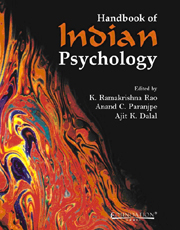Book contents
- Frontmatter
- Contents
- Contributing Authors
- Preface
- 01 Prologue: Introducing Indian Psychology
- 02 Indian Thought and Tradition: A Psychohistorical Perspective
- PART I SYSTEMS AND SCHOOLS
- PART II TOPICS AND THEMES
- PART III APPLICATIONS AND IMPLICATIONS
- 24 Therapeutic Psychology and Indian Yoga
- 25 Towards an Indian Organizational Psychology
- 26 Research on Indian Concepts of Psychology: Major Challenges and Perspectives for Future Action
- 27 Meditative Traditions and Contemporary Psychology
- 28 Consciousness Evolution of the Buddha until He Attained Satori
- 29 William James on Pure Experience and Samādhi in Sāṃkhya Yoga
- 30 Sri Ramaṇa Maharshi: A Case Study in Self-Realization
- 31 Altered States of Consciousness and the Spiritual Traditions: The Proposal for the Creation of State-Specific Sciences
- Pronunciation and Transliteration of Sanskrit Alphabet
- Glossary
- Index
25 - Towards an Indian Organizational Psychology
from PART III - APPLICATIONS AND IMPLICATIONS
Published online by Cambridge University Press: 26 October 2011
- Frontmatter
- Contents
- Contributing Authors
- Preface
- 01 Prologue: Introducing Indian Psychology
- 02 Indian Thought and Tradition: A Psychohistorical Perspective
- PART I SYSTEMS AND SCHOOLS
- PART II TOPICS AND THEMES
- PART III APPLICATIONS AND IMPLICATIONS
- 24 Therapeutic Psychology and Indian Yoga
- 25 Towards an Indian Organizational Psychology
- 26 Research on Indian Concepts of Psychology: Major Challenges and Perspectives for Future Action
- 27 Meditative Traditions and Contemporary Psychology
- 28 Consciousness Evolution of the Buddha until He Attained Satori
- 29 William James on Pure Experience and Samādhi in Sāṃkhya Yoga
- 30 Sri Ramaṇa Maharshi: A Case Study in Self-Realization
- 31 Altered States of Consciousness and the Spiritual Traditions: The Proposal for the Creation of State-Specific Sciences
- Pronunciation and Transliteration of Sanskrit Alphabet
- Glossary
- Index
Summary
There are two ways of doing meaningful organizational research in a large, populous country like India. First, we can start with cross-cultural theories and test them in the Indian context. This approach is better than the pseudo-etic approach in which people invariably start with Western models. Second, we can start with indigenous ideas to develop models, and then examine the cross-cultural theories and Western ideas in light of these indigenous models. I present examples of both these approaches. It is hoped that researchers will put a moratorium on pseudo-etic research that leads to the mindless copying of Western ideas, and start paying attention to indigenous ideas in psychology in India.
Psychology was quite established as an empirical science in the West, both in the USA and in Europe, by 1950. However, in India it was still a part of the discipline of philosophy. Organizational psychology was even slower to start since the economy was primarily driven by the public sector, which lacked the motivation to be profitable and efficient. Organizational psychology has been driven by efficiency and improvement of work performance in the West, and in the absence of these drivers it is not surprising that organizational psychology did not grow as much in India. Sinha (1972) presented the early history of organizational psychology, and suffice to say that much like other areas of psychology, organizational psychology jumped on the bandwagon of “mindless” copying of the West. In the 1950s, the Zeitgeist was filled with the spirit of national development, and Western countries offered the gold standard for development.
- Type
- Chapter
- Information
- Handbook of Indian Psychology , pp. 471 - 491Publisher: Foundation BooksPrint publication year: 2008
- 27
- Cited by

